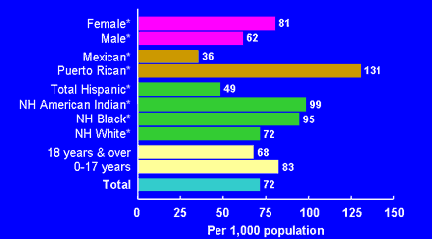Question Sheet: Attacking Asthma
Share this:
- Share via email (Opens in new window) Email
- Click to share on Facebook (Opens in new window) Facebook
- Click to share on X (Opens in new window) X
- Click to share on Pinterest (Opens in new window) Pinterest
- Click to share on Reddit (Opens in new window) Reddit
- Share to Google Classroom (Opens in new window) Google Classroom
- Click to print (Opens in new window) Print
Before reading:
- Do you know anyone with asthma? How does it affect him or her?
- What factors might cause a disease to become more common?
During reading:
- How has the number of asthma cases changed between 1980 and 1996?
- What happens in the lungs when someone is having an asthma attack?
- In what ways is asthma connected with allergies?
- What does NHANES stand for? In what ways is this study helping in the quest
to understand the causes of asthma?
- Describe the hygiene hypothesis.
- What evidence is there that most kids with asthma can live normal lives?
After reading:
- What are the symptoms of asthma? Why is asthma increasing? See www.nsc.org/EHC/asthma/q&a.htm(National Safety Council).
- Although people with asthma can live a “normal life,” what advice would you
give to a friend with asthma to help keep his or her attacks to a minimum? See
www.nationaljewish.org/disease-info/diseases/asthma/
kids/wizard/chapter16.aspx
(National Jewish Medical and Research Center).
- What conditions make asthma worse? See www.nationaljewish.org/disease-info/diseases/asthma/
kids/wizard/chapter6.aspx
(National Jewish Medical and Research Center).
- How does asthma medicine work? See www.nationaljewish.org/disease-info/diseases/asthma/
kids/wizard/chapter11.aspx
(National Jewish Medical and Research Center).
- Do you think that antibacterial soap is a good idea for kids? Why or why
not? Name three positive and negative aspects of our increasing ability to
eliminate most germs. See www.mercola.com/2000/jun/17/anti_bacterial_soap.htm (Dr.
Joseph Mercola).
- In what ways can a germ-free life cause problems for the body’s immune
system? See www.sciencenews.org/pages/sn_arc99/8_14_99/bob2.htm
(Science News).
SOCIAL STUDIES
Take a look at the following list of famous people who have or had asthma: www.getasthmahelp.org/famous_people.asp (Asthma Initiative of Michigan) or www.aanma.org/playtime/pt_famouspeople.htm (Allergy & Asthma Network Mothers of Asthmatics). Pick one person from the list. Find out when and where he or she lived. What is this person famous for? How did asthma affect his or her life?
LANGUAGE ARTS
- How do you think the world would change if the number of asthma patients
continues to rise at a rapid pace? Write a short story highlighting one way in
which a future world might be different if most people had asthma. What
equipment or inventions might exist to help people with their breathing
troubles?
- Design a poster explaining how asthma affects the lungs or showing what
children with asthma can do to live more normally. See www.aaaai.org/media/photos_graphics/illustrations.stm or www.aaaai.org/patients/just4kids/postercontest/2005winners.stm
(American Academy of Allergy Asthma & Immunology).
MATHEMATICS
Take a look at the data on the occurrence of asthma in the United States in the following figure. In each case, the number gives how many out of every 1,000 people in different categories would have asthma.
 |
| National Center for Health
Statistics |
Are males or females more likely to have asthma? Are there more
asthma cases among those who are less than 18 years old or those who are more
than 18 years old? Which group of people appears to have the highest rate of
occurrence of asthma? Given that there are 72 cases of asthma for every 1,000
people in the United States, which groups of people have a higher rate than
this?